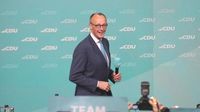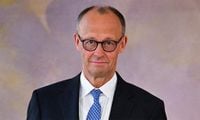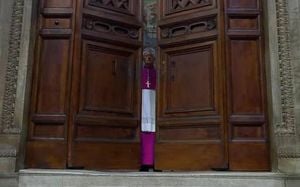On May 6, 2025, Friedrich Merz officially became the Chancellor of Germany after a dramatic parliamentary vote that saw him initially fall short of the required support. In a historic twist, this marked the first time in post-war German history that a prime ministerial candidate failed to secure enough votes in the first round of voting.
During a tense session in the Bundestag, 325 members of parliament voted in favor of Merz, surpassing the necessary 316 votes to take office. This came after an unexpected setback earlier in the day, where he only received 310 votes in the first round, a shocking result that left the political landscape in Germany uncertain.
Merz, who leads the conservative Christian Democratic Union (CDU) and its Bavarian sister party, the Christian Social Union (CSU), was elected following a coalition agreement with the center-left Social Democratic Party (SPD). This rare alliance was formed to prevent the far-right Alternative for Germany (AfD) party from gaining power, highlighting the ongoing tensions within German politics.
In the aftermath of his election, Merz was appointed by President Frank-Walter Steinmeier in a ceremony at Bellevue Palace. As he prepares to lead, he faces significant challenges, particularly in restoring trust within his coalition and navigating Germany's economy, which is currently experiencing stagnation.
Merz's coalition, which holds a fragile majority with only 52% of the parliamentary seats, underscores the delicate balance of power in the Bundestag. Analysts have expressed concerns about the stability of this government, especially given the internal divisions that were exposed during the voting process.
During the parliamentary session, both the Green Party and the Left Party supported the call for a second vote, emphasizing the urgency to establish a functioning government. Felix Banaszak, leader of the Green Party, stated, "We will not use tricks to hinder the formation of a new government." This sentiment reflects a broader desire among various political factions to stabilize the situation.
Despite his victory, Merz's approval ratings have reportedly declined since his party's electoral win in February, raising questions about his ability to govern effectively. His leadership will be tested not only by domestic issues but also by the shifting geopolitical landscape, particularly with the return of Donald Trump as U.S. President.
Merz has committed to restoring Germany's economy and strengthening its role in Europe amidst these changes. He has voiced concerns about the reliability of the U.S. as an ally in security matters, especially in light of Trump's criticisms regarding NATO funding and tariffs that have impacted German exports.
As he steps into his new role, Merz plans to engage with international leaders, including a scheduled phone conversation with President Trump on May 8, 2025. This will be a crucial moment for Merz as he seeks to reaffirm Germany's position on the global stage.
In his remarks prior to the vote, Merz acknowledged the profound changes and instabilities facing the nation, stating, "We are living in an era with profound changes, fluctuations, and great instability. That is why we know that our historical duty is to lead the alliance to success." His call for unity and strength reflects the challenges that lie ahead.
With the political landscape in Germany evolving rapidly, the coming weeks will be critical for Merz as he navigates the complexities of leading a coalition government. The eyes of both domestic and international observers will be on him as he attempts to solidify his leadership and address the pressing issues facing Germany.
As the new Chancellor, Merz is tasked with not only managing internal party dynamics but also reinforcing Germany's commitment to its European partners and maintaining stability in a time of uncertainty. His administration's success will depend on its ability to bridge divides and foster cooperation among the various political factions.
Ultimately, Friedrich Merz's ascension to the chancellorship is a pivotal moment in German politics, one that could shape the country's future direction in both domestic and foreign policy. As he prepares to take the oath of office, the challenges ahead remain daunting, but the potential for impactful leadership is palpable.





